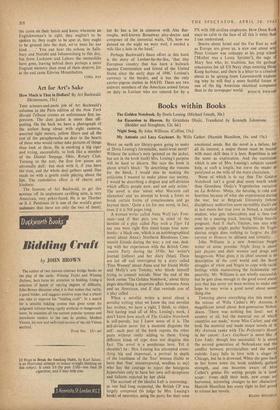Books within Books
The Golden Notebook. By Doris Lessing. (Michael Joseph, 30s.) Night Song. By John Williams. (Collins, 15s.) My Antonia and Lucy Gayheart. By Willa Cather. (Hamish Hamilton, 16s. and I5s.) WHAT on earth are library-goers going to make of Doris Lessing's formidable, multi-level novel? Without the author's note (printed on the jacket, but not in the book itself) Mrs. Lessing's purpose will be hard to discern. She says the book is about artist's block : 'In describing the reasons for the block, I would also be making the criticisms I wanted to make about our society.
would be describing a disgust and self-division which afflicts people now, and not only artists.' The novel is also 'about what Marxists call alienation' and 'an attempt to break a form; to break certain forms of consciousness and go beyond them.' Quite a lot for one novel, in fact, even if it is 568 pages long.
A woman writer called Anna Wulf (née Free- man—and if that puts you in mind of the heroine of a play called Play with a Tiger I'd say you were right first time) keeps four note- books: a black one, which is an autobiographical novel about Anna's Northern Rhodesian Com- munist friends during the war; a red one, deal- ing with her experiences with the British Com- munist Party during the 1950s; her writer's journal (yellow) and her diary (blue). These are led off and interrupted by a story called 'Free Women' about Anna and her friend Molly and Molly's son Tommy, who blinds himself trying to commit suicide. Near the end of the book comes 'The Golden Notebook,' about thirty pages describing a desperate affair between Anna and an American, and if that reminds you of a play called . . .
When a novelist writes a novel about a novelist writing what we know the real novelist has written, we have a right, I think, to object. Not having read all of Mrs. Lessing's work, I don't know how much of The Golden Notebook is self-parody, but I know some of it is. The self-divisioh never for a moment disguises the self: each part of the book repeats the other parts without really adding to them. Using different kinds of type does not disguise this fact. The novel is a ponderous bore. Yet it shouldn't be: Mrs. Lessing has attempted some- thing big and important, a portrait in depth of the loneliness of the 'free' woman (liable to have that 'free' misinterpreted, needless to say) who has the courage to reject the bourgeois hypocrisies only to have her own self-deceptions and failures rejected by her child.
The account of the idealist Left is interesting: as one had long suspected, the British CP was largely composed (to judge by Mrs. Lessing's book) of neurotics, using the party for their own
emotional needs. But the novel is a failure, for all its interest; a major theme must be treated
with more skill than it is here. Repetition is not the same as exploration. And the narcissism which is one of Mrs. Lessing's subjects cannot help, at such a length, but leave the reader as paralysed as the wills of the main characters.
None of which is to say that The Goldca Notebook isn't a good deal more worth while than Grozdana Olujic's Yugoslavian variation on La Bohetne. Minja, the heroine, is cold and heartless because of what she experienced during I the war, but at Belgrade University (whose disciplinary authorities seem incredibly slack) she at last meets her true love in Nenad, a medica student, who gets tuberculosis and is then run over by a passing• truck, leaving Minja heavily pregnant. And if that's Titoism, one sees why some people might prefer Stalinism. Its Yugo slavian origin does nothing to forgive An EX• cursion to Heaven its silliness and triviality.
John Williams is a new American Negro writer of some promise. Night Song is about
jazz players and their women and drugs and hangers-on. What gives it its chief interest is its description of the cool world and the fierce struggles of white and Negro to cope with racial feelings while maintaining the fashionable im passivity. Mr. Williams is not wholly successful but he gets close enough to the good novel abou jazz that has never yet been written to make om hope he may write a good novel about some thing else.
Towering above everything else this week is the reissue of Willa Cather's My Antonia, a magnificent novel about first-generation Nebra skans. 'There was nothing but land : not e country at all, but the material out of which countries are made,' wrote Miss Cather, and she took the material and made major novels of My Antonia ranks with The Professor's House in her canon: Lucy Gayheart is more like Lost Lady, though less successful. It is about the second generation of Nebraskans and the conflict between provincialism and the world outside. Lucy falls in love with a singer
Chicago, but he is drowned. When she goes back to her home town the book suddenly gathers strength, and one becomes aware of Miss Cather's genius for setting people in a land' scape: rivers shift their beds, new crops are harvested, mirroring changes in her characters Hamish Hamilton has every right to feel proud to reissue her novels.
JULIAN MI1 CHELI


































 Previous page
Previous page